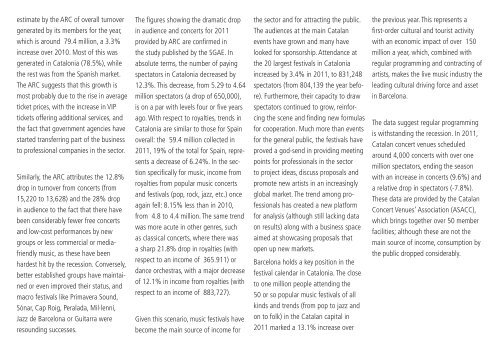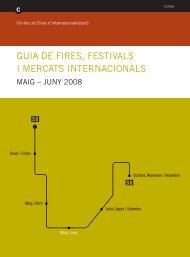Directori Catalan! - Catalan! Arts
Directori Catalan! - Catalan! Arts
Directori Catalan! - Catalan! Arts
Create successful ePaper yourself
Turn your PDF publications into a flip-book with our unique Google optimized e-Paper software.
estimate by the ARC of overall turnover<br />
generated by its members for the year,<br />
which is around €79.4 million, a 3.3%<br />
increase over 2010. Most of this was<br />
generated in Catalonia (78.5%), while<br />
the rest was from the Spanish market.<br />
The ARC suggests that this growth is<br />
most probably due to the rise in average<br />
ticket prices, with the increase in VIP<br />
tickets offering additional services, and<br />
the fact that government agencies have<br />
started transferring part of the business<br />
to professional companies in the sector.<br />
Similarly, the ARC attributes the 12.8%<br />
drop in turnover from concerts (from<br />
15,220 to 13,628) and the 28% drop<br />
in audience to the fact that there have<br />
been considerably fewer free concerts<br />
and low-cost performances by new<br />
groups or less commercial or mediafriendly<br />
music, as these have been<br />
hardest hit by the recession. Conversely,<br />
better established groups have maintained<br />
or even improved their status, and<br />
macro festivals like Primavera Sound,<br />
Sónar, Cap Roig, Peralada, Mil·lenni,<br />
Jazz de Barcelona or Guitarra were<br />
resounding successes.<br />
The figures showing the dramatic drop<br />
in audience and concerts for 2011<br />
provided by ARC are confirmed in<br />
the study published by the SGAE. In<br />
absolute terms, the number of paying<br />
spectators in Catalonia decreased by<br />
12.3%. This decrease, from 5.29 to 4.64<br />
million spectators (a drop of 650,000),<br />
is on a par with levels four or five years<br />
ago. With respect to royalties, trends in<br />
Catalonia are similar to those for Spain<br />
overall: the €59.4 million collected in<br />
2011, 19% of the total for Spain, represents<br />
a decrease of 6.24%. In the section<br />
specifically for music, income from<br />
royalties from popular music concerts<br />
and festivals (pop, rock, jazz, etc.) once<br />
again fell: 8.15% less than in 2010,<br />
from €4.8 to 4.4 million. The same trend<br />
was more acute in other genres, such<br />
as classical concerts, where there was<br />
a sharp 21.8% drop in royalties (with<br />
respect to an income of €365.911) or<br />
dance orchestras, with a major decrease<br />
of 12.1% in income from royalties (with<br />
respect to an income of €883,727).<br />
Given this scenario, music festivals have<br />
become the main source of income for<br />
the sector and for attracting the public.<br />
The audiences at the main <strong>Catalan</strong><br />
events have grown and many have<br />
looked for sponsorship. Attendance at<br />
the 20 largest festivals in Catalonia<br />
increased by 3.4% in 2011, to 831,248<br />
spectators (from 804,139 the year before).<br />
Furthermore, their capacity to draw<br />
spectators continued to grow, reinforcing<br />
the scene and finding new formulas<br />
for cooperation. Much more than events<br />
for the general public, the festivals have<br />
proved a god-send in providing meeting<br />
points for professionals in the sector<br />
to project ideas, discuss proposals and<br />
promote new artists in an increasingly<br />
global market. The trend among professionals<br />
has created a new platform<br />
for analysis (although still lacking data<br />
on results) along with a business space<br />
aimed at showcasing proposals that<br />
open up new markets.<br />
Barcelona holds a key position in the<br />
festival calendar in Catalonia. The close<br />
to one million people attending the<br />
50 or so popular music festivals of all<br />
kinds and trends (from pop to jazz and<br />
on to folk) in the <strong>Catalan</strong> capital in<br />
2011 marked a 13.1% increase over<br />
the previous year. This represents a<br />
first-order cultural and tourist activity<br />
with an economic impact of over €150<br />
million a year, which, combined with<br />
regular programming and contracting of<br />
artists, makes the live music industry the<br />
leading cultural driving force and asset<br />
in Barcelona.<br />
The data suggest regular programming<br />
is withstanding the recession. In 2011,<br />
<strong>Catalan</strong> concert venues scheduled<br />
around 4,000 concerts with over one<br />
million spectators, ending the season<br />
with an increase in concerts (9.6%) and<br />
a relative drop in spectators (-7.8%).<br />
These data are provided by the <strong>Catalan</strong><br />
Concert Venues’ Association (ASACC),<br />
which brings together over 50 member<br />
facilities; although these are not the<br />
main source of income, consumption by<br />
the public dropped considerably.



